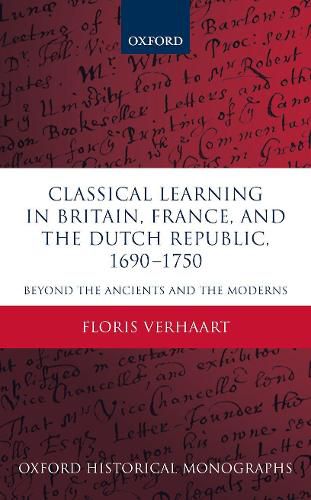Readings Newsletter
Become a Readings Member to make your shopping experience even easier.
Sign in or sign up for free!
You’re not far away from qualifying for FREE standard shipping within Australia
You’ve qualified for FREE standard shipping within Australia
The cart is loading…






For much of western history, the achievements of classical antiquity were seen as unsurpassable, and works by Latin and Greek authors were viewed as treasure troves of information still useful for contemporary society. By the late seventeenth century, however, the progress of scientific discoveries and the new paradigms of rationalism and empiricism meant the authority of the ancients was called into question. Those working on the classical past and its literature debated new ways of defending their relevance for society. The different approaches to classical literature defended in these debates explain how the writings of ancient Greece and Rome could become a vital part of eighteenth-century culture and political thinking.Floris Verhaart analyses these eighteenth-century debates about the value of classics, arguing that the Enlightenment, though often seen as an age of reason and modernity, in fact continuously sought inspiration from preceding traditions and ages such as Renaissance humanism and classical antiquity. The volume offers an interesting parallel with the modern day, in which the relationship between ‘experts’ and the general public has become the topic of debate and many academics, especially in the humanities, face pressure to explain how their work benefits society at large.
$9.00 standard shipping within Australia
FREE standard shipping within Australia for orders over $100.00
Express & International shipping calculated at checkout
For much of western history, the achievements of classical antiquity were seen as unsurpassable, and works by Latin and Greek authors were viewed as treasure troves of information still useful for contemporary society. By the late seventeenth century, however, the progress of scientific discoveries and the new paradigms of rationalism and empiricism meant the authority of the ancients was called into question. Those working on the classical past and its literature debated new ways of defending their relevance for society. The different approaches to classical literature defended in these debates explain how the writings of ancient Greece and Rome could become a vital part of eighteenth-century culture and political thinking.Floris Verhaart analyses these eighteenth-century debates about the value of classics, arguing that the Enlightenment, though often seen as an age of reason and modernity, in fact continuously sought inspiration from preceding traditions and ages such as Renaissance humanism and classical antiquity. The volume offers an interesting parallel with the modern day, in which the relationship between ‘experts’ and the general public has become the topic of debate and many academics, especially in the humanities, face pressure to explain how their work benefits society at large.